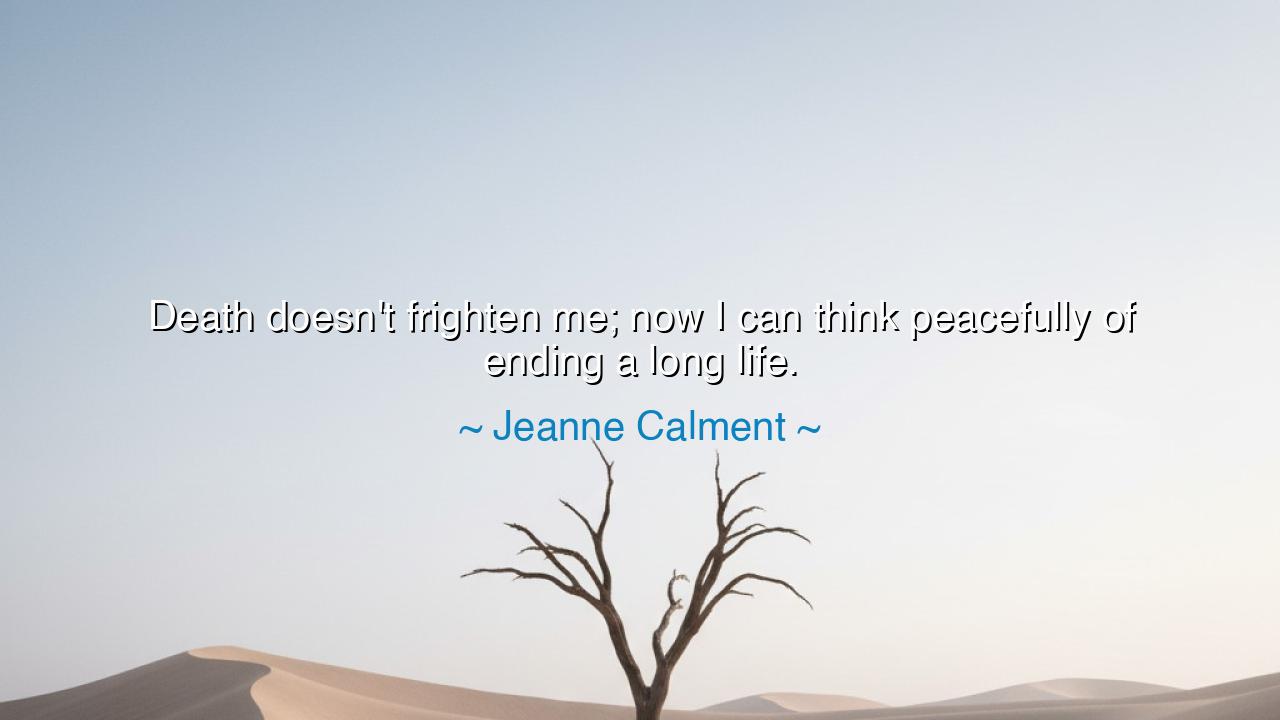
Death doesn't frighten me; now I can think peacefully of ending a






The words of Jeanne Calment, “Death doesn’t frighten me; now I can think peacefully of ending a long life,” rise like a serene wind through the corridors of time, whispering the wisdom of one who has seen the full circle of existence. Spoken by the woman who lived the longest recorded human life, these words are not born of despair, but of acceptance — the calm understanding that all things which begin must one day cease. To the hurried and fearful, death is a shadow; to Jeanne, it was the closing of a beautiful day, after the long labor of dawn and noon. Hers is not the cry of resignation, but the hymn of one who knows that peace lies not in escaping death, but in embracing life fully until its final breath.
In the ancient world, the wise spoke often of this quiet readiness. Socrates, on the eve of his own death, drank the hemlock without trembling. He told his students that philosophy itself is a preparation for dying — for to love truth and to know oneself is to loosen the chains of fear. In the same way, Jeanne’s words carry that ageless calm: she had looked upon time’s unending river and realized that death was not an enemy, but the returning tide. It is not death that must be feared, but a life unlived. For those who have truly lived, death comes not as terror, but as fulfillment — the final chapter of a well-told story.
Jeanne Calment’s long life, spanning more than a century, was filled not with the thirst for eternity, but with joy in the present moment. She saw kings fall, wars rage, and the world transform from horse-drawn carriages to flight and electricity. Yet she remained untroubled by the passing of eras, laughing gently when asked the secret of her longevity. Her peace came not from escaping time, but from dwelling gracefully within it. To live long is not the same as to live well, yet Jeanne did both — and when her time drew near, she welcomed it like an old friend who had walked beside her unseen.
Her words echo the Stoic wisdom of Marcus Aurelius, who wrote, “It is not death that a man should fear, but he should fear never beginning to live.” Jeanne’s serenity came from a life without regret, for she had spent her years in wonder rather than worry. When she spoke of thinking peacefully of the end, she revealed the truth that peace comes from the balance of life’s joys and sorrows accepted as one. Those who battle against the flow of fate drown in exhaustion; those who yield to its rhythm discover tranquility.
In this, there is also something heroic. It takes courage to face the final silence without trembling, to stand at the threshold and say, “I am ready.” The ancient warriors understood this. The Samurai, before battle, would meditate upon death each morning, so that fear might lose its power. By dying each day in thought, they lived each day in freedom. Jeanne, too, lived as one unafraid, her laughter defying the years, her spirit unbroken by time. This is not the quiet of surrender — it is the strength of acceptance.
To those who listen today, her words carry a sacred lesson: that the art of dying begins with the art of living. Live so that death does not frighten you. Seek peace not by hiding from mortality, but by embracing each sunrise as if it were your last. Speak kindly, create boldly, forgive often, and fill your days with meaning — for in the end, it is not the number of years that matters, but the weight of the soul they hold.
And when your own twilight comes, may you, like Jeanne Calment, look upon the horizon and say with calm heart: “I have lived. I have seen. I am ready.” For death, then, will not be a thief in the night, but a gentle companion guiding you home. This is the wisdom of the ancients, reborn in the voice of a modern sage — that to live without fear of death, one must love life without clinging to it. So live now, with courage and gratitude, until peace itself becomes your final breath.






AAdministratorAdministrator
Welcome, honored guests. Please leave a comment, we will respond soon